| Srl | Item |
| 1 |
ID:
186970
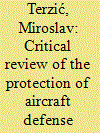

|
|
|
|
|
| Summary/Abstract |
The conflict between the armed forces of the Republic of Azerbaijan and the armed forces of Nagorno Karabakh in the Nagorno Karabakh region analyzed in this paper covers the period from 26 September 2020 to 11 October 2020. The Armed Forces of the Republic of Azerbaijan conducted an offensive operation with the maximum use of unmanned aerial vehicle (UAV) in order to achieve success in the initial phase of the operation by targeting land forces in prepared defensive positions, air-defence systems, and command posts. Effects of the actions of UAV shown on footage published by Azerbaijan Armed forces indicate that the Nagorno Karabakh armed forces failed to anticipate and to provide protection of the land forces against mass use of UAV, primarily the air defense systems. This paper analyzes the physical and military dimension of the conflict with focus on the shortcomings in the protection of the air defense systems from mass use of UAV. Based on the analysis, the paper presents recommendations for improving the protection of the air defense systems against UAV on tactical level.
|
|
|
|
|
|
|
|
|
|
|
|
|
|
|
|
| 2 |
ID:
186969
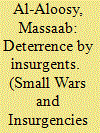

|
|
|
|
|
| Summary/Abstract |
Deterrence between states is a long-established theory in security studies, but it is rare, if not unique, that an insurgency would deter a state from attacking another country. Insurgencies in the Middle East are increasingly playing an international role, of which deterrence is only a part. This generates an interesting dynamic in which an insurgency uses non-traditional tools to dissuade an adversarial state from attacking the group or country in which it resides. Thus, the research topic is: How is Hezbollah able to deter Israel?
|
|
|
|
|
|
|
|
|
|
|
|
|
|
|
|
| 3 |
ID:
186972
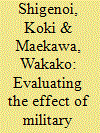

|
|
|
|
|
| Summary/Abstract |
This article examines the effect of foreign military intervention on rebel governance in terms of disaggregated human security. Case studies reveal that, on the one hand, a ‘thirst for legitimacy’ influenced by military intervention has led rebel groups to engage in internal and external diplomatic activities. Moreover, their efforts to develop fundamental rebel governance structures have had clearly positive effects on human security. On the other hand, when repelled from a territory by military interventions, rebel groups have attempted to control their remaining territories through the imposition of fear, which can devastate human security in rebel-held areas.
|
|
|
|
|
|
|
|
|
|
|
|
|
|
|
|
| 4 |
ID:
186966
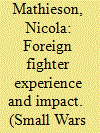

|
|
|
|
|
| Summary/Abstract |
This paper examines the relationship between prior conflict experience and the impact of foreign fighters on armed groups. This paper addresses the findings in existing research that describes foreign fighters as both assets and liabilities by disaggregating foreign fighters into first-conflict foreign fighters and veteran foreign fighters. While prior experience determines the potential impact of foreign fighters, I introduce the concept of foreign fighter integration to understand how this experience is utilized or leveraged by armed groups. The theory-building framework helps explain why we see certain groups leverage foreign fighters in ways that shape their repertoires of violence, tactics, or even ideology, while, in other instances, the influence of foreign fighters appears to be limited – with any consequent effects restricted to the small factions into which foreign fighters have been assigned. Using this theoretical framework of experience and integration, I re-examine in the cases Somalia and Bosnia and Herzegovina to demonstrate how and where foreign fighters impact armed groups.
|
|
|
|
|
|
|
|
|
|
|
|
|
|
|
|
| 5 |
ID:
186967
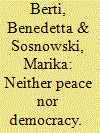

|
|
|
|
|
| Summary/Abstract |
This article examines the role of siege warfare and population control in the coercive counterinsurgency strategy used by the Syrian regime of Bashar al-Assad to effectively crush the revolution that began in 2011. We extend the coercive counterinsurgency framework offered by Monica Duffy Toft and Yuri Zhukov to analyze the Syrian regime’s use of the twin tactical pillars of siege warfare and population control. We focus on how these two types of denial – military and political – proved essential to the regime’s military victory.
|
|
|
|
|
|
|
|
|
|
|
|
|
|
|
|
| 6 |
ID:
186971
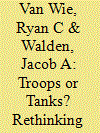

|
|
|
|
|
| Summary/Abstract |
Are some conventional military units better equipped to conduct counterinsurgency (COIN) operations than others? COIN theorists and practitioners disagree about mechanization’s impact on COIN effectiveness. We suggest that mechanization is not the critical determinant of COIN effectiveness. Rather, mechanization’s effects vary based on a unit’s force employment approach within local scope conditions. To test our hypothesis, we explore how mechanization impacts COIN operations in Ramadi and Basra and find that force employment is the critical determinant in COIN effectiveness. We introduce an adaptive force employment hypothesis that outlines how mechanization includes costs to exposing dismounted troops and benefits in information-sharing, conditional on local insurgent strength. This hypothesis suggests that mechanized forces provide significant benefits to counterinsurgents when clearing high strength insurgents, outweighing benefits from dismounted civilian interaction. Following successful clearance operations when government control is increased and insurgent strength is reduced, requirements for armored protection decrease while civilian tips become increasingly important to target remaining insurgents. In the hold and build stages, counterinsurgents can increasingly rely on dismounted troops.
|
|
|
|
|
|
|
|
|
|
|
|
|
|
|
|
| 7 |
ID:
186968
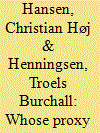

|
|
|
|
|
| Summary/Abstract |
How do state sponsors of proxy groups in civil wars balance their support of non-state militias with the need for political transition towards stability? This article explores the inconsistencies in Iran’s priorities and proxy strategy that at times limited Iranian influence, and complicated Iraq’s transition from war to peace. It expands on current theories on proxy warfare by focusing on the impact of diverging interests among foreign policy elites in a sponsor state. Three policy dilemmas illustrate the difference among on the one side the Revolutionary Guard and on the other side the Ministry of Foreign Affairs and Ministry of Intelligence. First, whether the pro-Iranian proxies should maintain their influence after the war or Iran should strengthen its link to the representatives of the formal state. Second, whether repression by Shia militias or political reconciliation should prevent Sunni Arabs from (re)joining Islamic State. Third, whether Iraq should be part of a sectarian, transnational alliance or an inclusive state that might become an arbiter to deescalate regional tension. The study contributes to the literature on Iranian proxy warfare in the Middle East and proxy warfare literature in general, by considering the consequences of differences among foreign policy elites.
|
|
|
|
|
|
|
|
|
|
|
|
|
|
|
|